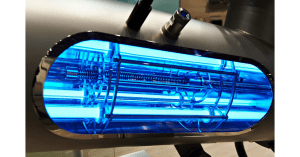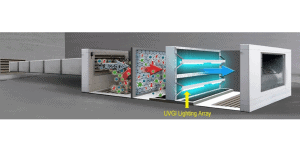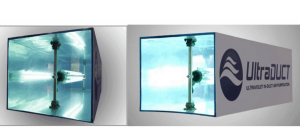As countries start to relax restrictions, questions arise about how post-lockdown scenarios will unfold and what the “new normal” will look like. Some countries are instituting behavioral changes such as social distancing and mask-wearing, while others consider issuing immunity passports or risk-free certificates.
Scientists have investigated the use of ultraviolet germicidal radiation (UVGI) to detect the virus in schools, restaurants, and other public places. This method involves using ultraviolet (UV) lights to disinfect contaminated public spaces and prevent the spread of the virus.
Ultraviolet (UV) light from the sun has shorter wavelengths than visible light and is not visible to the naked eye. The full spectrum of UV radiation is sourced from the sun and can be subdivided into UV-A, UV-B, and UV-C rays. Among these, UV-C rays are the most harmful and are completely absorbed by the Earth’s atmosphere. While both UV-A and UV-B rays are harmful, exposure to UV-B rays can cause DNA and cellular damage in living organisms.
So, how does UVGI work?

UVGI utilizes the “destructive properties” of UV light to target pathogens, making it effective in disinfecting the air and preventing the spread of certain infectious diseases.
To explain further, UVGI mimics UV wavelengths to disinfect contaminated spaces, air, and water. According to the US Centers for Disease Control and Prevention (CDC), the effectiveness of UVGI depends on its dose. In 2005, the CDC revised its guidelines for using UVGI in relation to the spread of tuberculosis (TB) in hospital settings.
According to a report in The New York Times, scientists are recommending the use of fixtures containing UVGI lamps that can be installed in the ducts or inside the coils of the AHUs, which are similar to fluorescent lights, to emit light and trap pathogens. Alternatively, UVGI lamps can be installed in the corners of a room or in air ducts of ventilation systems, or used in portable or fixed air cleaners.
Why UVGI?

ASHRAE acknowledges the health benefits of UVGI and considers the technology as a potentially beneficial option for facility managers to consider employing in their buildings. UVGI, also known as UV-C, employs light in the electromagnetic spectrum to kill or prevent the growth of virtually all known microorganisms. In HVAC systems, mold and some bacteria can grow in damp areas around cooling coils, drain pans, plenum walls, and filters. The growth of microbial deposits leads to coil fouling, which increases coil pressure drop and reduces airflow and heat-exchange efficiency. Positioned downstream of the cooling coil in the direction of airflow, UV-C lamps can return HVAC systems to their original, design performance standards, or as-built conditions, in as little as 90 days and cut energy use by 10-25 percent on average. Simultaneously, UVGI for HVAC systems helps prevent the same microorganisms from being recirculated into the indoor air, thereby impeding disease transmission and/or cross contamination.
Due to these reasons, ASHRAE recommends that building designers, owners, and operators prioritize enhancing well-designed, installed, commissioned, and maintained HVAC systems with supplemental…UVGI.
Alfaa UV’s UVGI Solutions
UVGI is primarily delivered with three systems in Offices:
- UVGI Coil Solutions in AHUs
- UVGI Duct Solutions in AHUs
- Mobile UV Sterilizers for Room and Surface Disinfection
A) UltraCoil & UltraDuct
Alfaa UV’s ULTRACOIL UVGI System ensures deep cleaning of coils in the safest and most eco-friendly way. There is no worry about coil damage, which is highly likely with conventional chemicals and scrubbing methods. The Ultracoil with its unique Parabolic Reflector System proactively removes the bio-films, ensuring that the air does not get contaminated through the coil and drain pans. Especially in the current pandemic, installing a proper UVGI air disinfection system in front of the coil kills microorganisms and viruses, including Coronaviruses, disallowing the formation of a biofilm and preventing the spread of pathogens in the AHU itself. Other benefits of a clean coil include:
- Increase in the thermal efficiency (sensible loads) of the cooling coil.
- Decrease in the load on the chiller, saving energy by 10-15%.
- Reduction in microbial counts by over 15%.
- Increased coil lifespan by avoiding manual cleaning.
- Earning IGBC (Indian Green Building Council) points.
Alfaa UV’s ULTRADUCT solution provides assured single-pass disinfection of airborne bacteria and viruses. It is installed in supply or return ducts, increasing the life of HEPA (High-Efficiency Particulate Air) by reducing the load of live organisms.

There are various benefits of installing ULTRADUCT in HVAC systems, some of which are:
- Improves Indoor air quality.
- Helps in eliminating Sick Building Syndrome.
- Increases the life of HEPA.
- Scientifically designed systems are sized using proprietary sizing tools based on extensive research.
- Computational flow dynamics (CFD) and UV radiation profile modeling details used to make the system highly efficient and effective.

